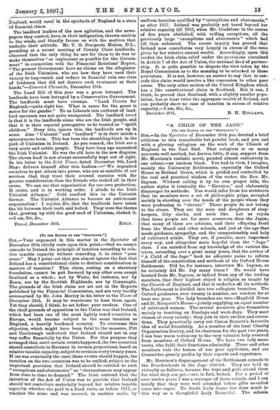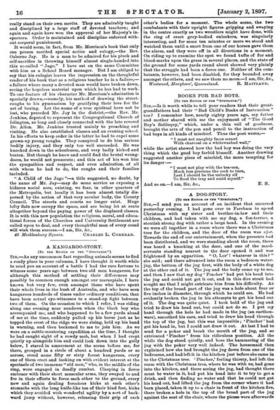"A CHILD OF THE JAGO."
[To THE EDITOR OF THE " SPECTATOH."]
SIE,—In the Spectator of December 26th you devoted a brief criticism to this remarkable but painful book, and you end with a glowing enlogium on the work of the Church of England in the East End. That eulogium is on many accounts well merited, but derives little, if any, support from Mr. Morrison's realistic novel, painted almost exclusively in one colour,—an unclean black. You had in view, I imagine, mainly the University Settlements, especially the Oxford House in Bethnal Green, which is guided and controlled by the zeal and practical wisdom of the rector, the Rev. Mr. Ingram. Without calling it by its own proper title, the author styles it ironically the "Elevator," and elaborately disparages its methods. You would infer from his strictures that its members were a set of philosophic prigs, occupied mainly in shooting over the heads of the people whom they were professing to "elevate." These people do not belong to the slums. They are the sons and daughters of shop- keepers, City clerks, and such like. Let us rejoin that these people are far more numerous than the Jagos ; that many of them are artisans, and their offspring fresh from the Board and other schools, and just at the age that needs guidance, sympathy, and the companionship and help of cultivated minds. They are, if possible, more important every way, and altogether more hopeful than the " Jago " class. I am satisfied from my knowledge of the various dis- tricts, extending over a great many years, that the author of "A Child of the Jago " took no adequate pains to inform himself of the constitution and methods of the Oxford House Settlement. Did he, for instance, interview Mr. Ingram, as he certainly did Mr. Jay many times ? He would have learned from Mr. Ingram, or indeed from any of the leading members, that their highest object is religion as taught by the Church of England, and that it underlies all its methods. The Settlement is divided into two collegiate branches. The Oxford graduates, over twenty in number, are resident for at least one year. The lady branches are two—Mayfield House and St. Margaret's House—jointly supplying an equal number of cultivated women. The several members give themselves mainly to teaching on Sundays and week-days. They meet classes of every variety; they join in their studies and recrea- tions. They practically carry out Canon Barnett's favourite idea of social friendship. As a member of the local Charity Organisation Society, and its chairman for the past two years, I can bear warm testimony to the very valuable help received from members of Oxford House. We have two lady secre- taries, who fulfil their functions admirably. These and other members visit the homes of our poor applicants, and our Committee greatly profits by their reports and experience.
Mr. Morrison's disparagement of the Settlement extends to the Board-schools in the Jago district. They are held up virtually as failures, because the boys and girls attend them for what they can get,—are, in fact, bribed. For a period of over twelve years I was a manager of these schools, and I can testify that they were well attended before gifts so-called came into vogue. No doubt Lady Jenne has done much in this way as a thoughtful Lady Bountiful. The schools
really stand on their own merits. They are admirably taught and disciplined by a large staff of devoted teachers; and again and again have won the approval of her Majesty's in- spectors. Order is maintained and discipline enforced with- out corporal punishment.
It would seem, in fact, from Mr. Morrison's book that only one person merited special notice and eulogy,—the Rev. Osborne Jay. He is a man to be admired for his pluck and self-sacrifice in throwing himself almost single-handed into this so-called " Jago." I have sat on the same Committee with him as a School Board manager. But I am obliged to say that his eulogist leaves the impression on the thoughtful reader of his book that as a religions teacher he is a failure,— a failure where many a devoted man would have broken down, seeing the hopeless material upon which he has had to work. To one feature of his character Mr. Morrison's admiration is specially drawn,—namely, his method of drawing the street- roughs to his gymnasium by gratifying their love for the art of boxing. Let the name of a true spiritual hero not be lost, who preceded Mr. Jay in the district,—the Rev. Mr. Jenkins, deputed to represent the Congregational Church of Islington, so long and closely connected with the late revered Dr. Allon. Mr. Jenkins trusted mainly to preaching and visiting. He also established classes and an evening school. In his efforts to keep order in the latter he had to expel some grown-up young roughs. They conspired to do him serious bodily injury, and they only too well succeeded. He was knocked down in the schoolroom, and very badly kicked and beaten. But though he knew and could find the brutal wrong- doers, he would not prosecute; and this act of his won him the sympathies and respect, and even admiration, of all with whom he had to do, the roughs and their families included.
"A Child of the Jago "—a title suggested, no doubt, by the name of Mr. Jay—may do some service as exposing a hideous social sore, existing, we fear, in other quarters of the Metropolis, but locally it has been almost totally dis- persed by the action of that very secular body, the County Council. The streets and courts no longer exist. Huge lofty flats now occupy the space, and are being let at rents altogether beyond the paying power of the displaced classes. It is with this new population the religious, moral, and educa- tional forces of the Churches and University Settlement are called upon to deal, and every thoughtful man of every creed will wish them success.—I am, Sir, Sze.,















































 Previous page
Previous page